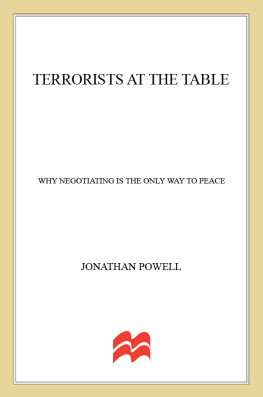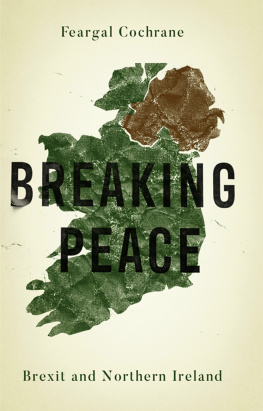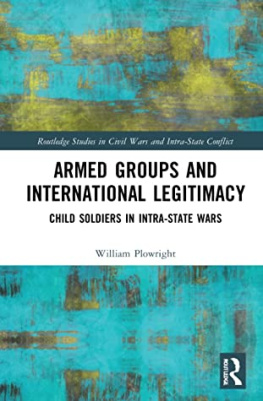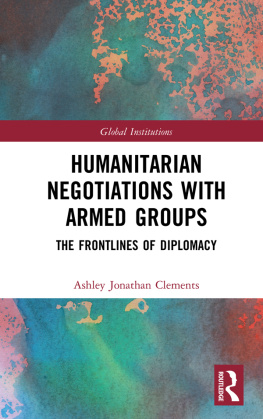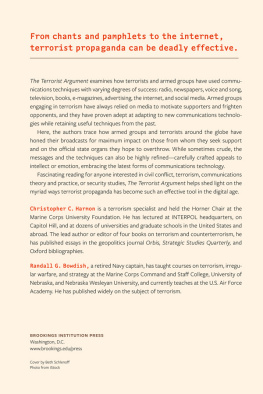Terrorists at the Table
Why Negotiating Is the Only Way to Peace
Jonathan Powell

The author and publisher have provided this e-book to you for your personal use only. You may not make this e-book publicly available in any way. Copyright infringement is against the law. If you believe the copy of this e-book you are reading infringes on the authors copyright, please notify the publisher at: us.macmillanusa.com/piracy .
To all the victims of terrorism, in the hope there will be fewer of them in the future if we learn the lessons of the past
Contents
ANCAfrican National Congress
ARENAAlianza Republicana Nacionalista
BATNAbest alternative to a negotiated agreement
CMICrisis Management Initiative
CODESAConvention for a Democratic South Africa
COHAcessation of hostilities agreement
COINUS Army and Marine Corps Manual on Counter-Insurgency
DDRdisarmament, demobilization, and reintegration
DUPDemocratic Unionist Party
ECOWASEconomic Community of West African States
EECEuropean Economic Community
ELNNational Liberation Army
ERPPeoples Revolutionary Army
ETAEuskadi Ta Askatasuna
FARC Fuerzas Armadas Revolucionarias de Colombia
FLNFront de Libration Nationale
FMLNFarabundo Mart National Liberation Front
FPLPopular Liberation Forces
FRELIMOMozambique Liberation Front
GALGrupos Antiterroristas de Liberacin
GAMGerakan Aceh Merdeka
HDCHenry Dunant Centre/Centre for Humanitarian Dialogue
ICCInternational Criminal Court
IICDIndependent International Commission on Decommissioning
INLAIrish National Liberation Army
IRAIrish Republican Army
ISILIslamic State of Iraq and the Levant
JSCJoint Committee on Security Modalities
JVPPeoples Liberation Front
LTTELiberation Tigers of Tamil Eelam
M-19Movimiento 19 de Abril
MHSmutually hurting stalemate
MILFMoro Islamic Liberation Front
MKUmkhonto We Sizwe
MPLAPopular Movement for the Liberation of Angola
NATONorth American Treaty Organization
NGOnongovernmental organizations
NISSouth African National Intelligence Service
PKKPartiya Karkeren Kurdistani
PLOPalestinian Liberation Organization
PNVBasque Nationalist Party
PPPeoples Party
PUPProgressive Unionist Party
RENAMOMozambican National Resistance
RNFuerzas Armada de la Resistenicia Nacional
RUCRoyal Ulster Constabulary
SDLPSocial Democratic and Labour Party
SISSecret Intelligence Service
TRCTruth and Reconciliation Commission
UDAUlster Defence Association
UNITANational Union for the Total Independence of Angola
UNPUnited National Party
UVFUlster Volunteer Force
ZANUZimbabwe African National Union
Peace hath her victories
No less renownd than war.
John Milton, Sonnet XVI, To the Lord General Cromwell
In May 2014, after lengthy negotiations, the US government secured the release of Sergeant Bowe Bergdahl in exchange for five Taliban prisoners held in Guantanamo. Instead of celebration, his release led to stinging attacks by Republican lawmakers who claimed President Obama had abandoned the decades-old US policy that we dont negotiate with terrorists. The charge, however, was completely ahistorical. While it is true the public position of the United States had long been that it would never deal with terrorists, previous presidents, including Nixon, Reagan, and George W. Bush, all Republicans, had in fact negotiated with terrorists.
Governments in all countries and of all political parties say they will never talk to terrorists. But they almost always end up doing so. During the decades of decolonization, the British government called Menachem Begin a terrorist after he blew up the King David Hotel, killing 91 people, but later lauded him as statesman. They locked up Jomo Kenyatta as a terrorist but later released him to negotiate Kenyan independence. And they exiled Archbishop Makarios to the Seychelles as a terrorist but released him to become the first elected leader of an independent Cyprus. In the words of British Labour Party leader Hugh Gaitskell, All terrorists, at the invitation of the government, end up with drinks in the Dorchester.
I was Tony Blairs chief of staff for thirteen and a half years, and during our ten years at 10 Downing Street I was also the chief British negotiator on Northern Ireland dealing with the IRA. When I left government in 2007 I argued, on the basis of my experience talking to Irish terrorists, that we should be prepared to talk to Hamas, to the Taliban, and even to al-Qaeda. A British Foreign Office spokesman predictably contradicted me, saying, It is inconceivable that Her Majestys Government would ever seek to reach a mutually acceptable accommodation with a terrorist organisation like al-Qaeda. It was acceptable to talk to the IRA and the PLO but not to these new groups. Now, only a few years later, that rule has been breached, and the United States has negotiated a cease-fire in Gaza with Hamas and the release of Sergeant Bergdahl with the Taliban. Even al-Qaeda appears not to be beyond the pale. Eliza Manningham-Buller, the former head of MI5, proposed in a speech in 2011 that Western governments should talk to the group.
Now we face a new terrorist group, ISIL. It is even more vicious than its predecessors, and the first reaction of governments in the face of videos of the beheadings of Western journalists and aid workers was to announce that we will degrade and ultimately destroy them, as President Obama put it. But if the earlier conflicts studied in this book are any guide, then we are very unlikely to destroy them by bombing alone. And even if there are eventually boots on the ground, it is not at all clear that that will solve the problem either. The experience of the last thirty years suggests that if we wish to end the conflict rather than just contain it, we must talk to ISIL, or whatever Islamist extremist organization succeeds it, just as we have with all the previous terrorist groups we have encountered. People ask, What on earth would we talk to them about? The answer is the same as with previous armed groups. We will not concede their central demandan Islamic caliphatebut we will discuss the legitimate grievances of Sunnis in Iraq and Syria who have been disenfranchised by sectarian governments in both countries. In the heat of our emotional reaction to their appalling acts, we dismiss the very idea of talking. But if we stop to consider our long-term strategy for dealing with the group, then the idea of dialogue can become obvious. Colin Parrys twelve-year-old son Tim was blown up by an IRA bomb in Warrington in the North of England in 1993. Parry says that if he had known as his son lay dying in his arms that at that very moment the British government was conducting secret negotiations with the IRA, he would have been horrified. But if someone had told him the same thing six months later, he would have been delighted because then he would have known that the conflict would end, and his son had not died in vain.
I dont mind the hypocrisy of governments on the subject of talking to terroriststhat is part and parcel of politicsbut I do mind the fact that we never seem to learn from past experiences, often with devastating consequences. Each time we meet a new terrorist group we start again from scratch, partly because governments change so regularly while the leaders of the terrorist groups tend to stay in place far longer. Gerry Adams and Martin McGuinness have seen eight British prime ministers come and go while they have been in the leadership of the Irish Republican movement. One of those involved in the disastrous 1998 to 2002 negotiations with the Colombian terrorist group FARC said, One gets the impression sometimes that the guerrillas think that every four years a new group is going to arrive [in government], to try the same thing over again.
Next page
